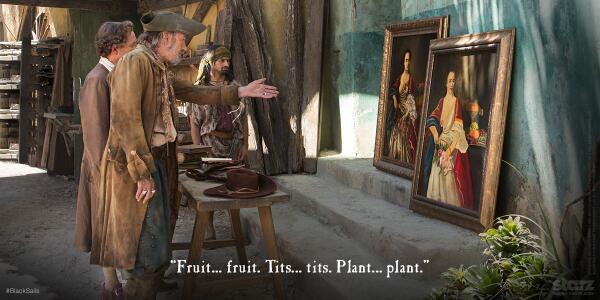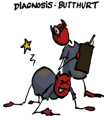Asserting a statement doesn't make it the truth.
Of course, because the definition of “hardcore cRPG” player involves the definition of “cRPG”, which involves the definition of “RPG”. I could spend 10 years researching the subject, write a whole book about it, and people would still disagree with me, because that is a complex and abstract subject, involves a lot of assumptions about the ontology of social artifacts, etc. Instead of presenting a definition, you can provide a simple characterization of the typical hardcore player, and they’re also illuminating. For instance, a typical hardcore player have the patience to dwell on a complex character building, which “Underrail”, “Age of Decadence” and “Serpents in the Staglands” have – I didn’t play “Legends of Eisenwald” or “Lords of Xulima”.
And you're telling me the D&D, GURPS, and other ruleset RPGs I listed didn't have these?
I notice that most people have this mistaken idea that when we are talking about games, the truth about the subject must be empirical, based on his impressions and widespread conventions. Thus, the same guy that knows that the apparent changeability of nature can’t be trusted and hide deep and complex patterns, will adopt a completely different, and borderline pseudo-scientific, attitude when the subject is games. Just because you see different cRPGs, that have more focus on particular aspects of gameplay, that doesn’t mean they’re not the same thing at the core. Just because you see different hardcore players, with different tastes about setting, amount of C&C or combat, doesn’t mean they’re not hardcore players at the core. You will need a considerable theoretic effort to establish that the superficial differences among cRPGs represents a deep difference at the fundamental level. Assuming they’re not the same thing because they look different is lazy thinking, because the subject is abstract and involves more than meets the eye.
All games have similarities at their core. Why don't you be specific as to what distinguishes Underrail, Age of Decadence, SitS, Eisenwald, and Xulima from the
financially successful games such as Wastelands 2, Shadowrun Returns, Legend of Grimrock, etc. from a gameplay, rather than marketing, level?
“Pillars of Eternity” raised over $4.5M on kickstarter, and had a team of known names of the industry. “Wasteland 2” raised over $3M in kickstarter and paypal, has a known veteran of the industry, etc. “Shadowrun Returns” almost $2M and Jordan Weisman name behind the project. “Legend of Grimrock” made by a small team of veterans and has eye candid graphics. So, the successful cRPGs you mentioned all have developers that are small celebrities and exceptional funding from kickstarter - the only exception being “Grimrock”, because it raised considerable less, but this is compensated by the graphics. What you forgot to mention, is that these success don’t have half of the complexity of “Age of Decadence”, “Underrail” and “Serpents”. So, let me repeat that again, numbers in sales are not reliable indicators of quality.
Which is why one of my suggestions is to get industry veterans involved, and I made no comment about "quality" as that is fairly subjective.
Niche of the niche indie games like “Undertale”, on the other hand, are a different beast entirely. They’re moved by the same hipster culture that helped to promote games like “Braid”, etc. When a lot of people are talking about a game that is super cheap, you attract buyers that are not gamers, and gamers who buy in the impulse. To talk about this experiment in comparison with proper cRPGs makes no sense.
It does make sense, because CRPGs don't need to be priced at 3x the $. Ever thought of a different business model? Episodic release? And for every comment made here about how "hipster" games such as Braid and Undertale are, I could find a similar one from before their release saying how the industry has no room for such games, because the dumb-arse masses will only consume games such as FIFA and Call of Duty.
That is if you consider success the amount of sales of “Pillars of Eternity” and “Wasteland 2”, which is an unfair comparison, whether in terms of money in funding, the size of the teams behind them or the fact they’re not veterans of the industry, but first timers. On the other hand, if you consider that this begin as part-time hobby, made by four people (three first timers) and sold more than 32k units for a good price, then that could be considerate a success, especially if you consider that the game is actually great.
Again, I don't know how Vince manages to stay in the business with 10+ years of development time for one title, but that's also why I'm not telling him to leave it. Whatever works, works, but what's cool about having sales data from tools such as steamspy is that you can start analyzing what sells, and what doesn't, at a commercial level beyond the old "AAA eye candy sells; dumb masses can't understand any other style."
There a lot of games with one or two endings. That is fluffy choice and consequence that give the players the illusion that they’re making meaningful choices. The developers can implement this in two days, no big deal. Systematized reactivity, on the other hand, is much harder to achieve and will consume all your resources. If you consider the amount of gameplay that additional choices and consequences represents in “Age of Decadence”, the game is huge.
See, my goal for bringing up the choices & consequences angle is that mainstream gaming is promoting the concept, so by that logic, there's no reason why any game that advertises its choices and consequences should be considered niche. You're not niche for following the mainstream buzz word.
Three arcade games whose combat can be encapsulated in one sentence: dodge and hit, dodge and hit. That is not hard in my dictionary, even if you evaluate their difficult in terms of reflex. I bet that a lot of Atari games are harder than them. The fact the only games with hard combat that sold more are arcade games just reinforced my other point: causal and console gamers don’t have the patience to dwell on a complex character building or combat systems. They want a sword to kill things and feel powerful.
See my response to Vince.
Well, people are not afraid of stat sheets when stat sheets are fluffy, because they like to have the illusion of character building. But when the stats really matter and you pay for your mistakes, causals hate. If a poorly made character died every time in Oblivion, players would hate the game to no end, it would sell shit. I’m pretty sure that most jRPGs don’t have stats either, at least that’s my memory tell me regarding jRPGs in consoles.
So what you're saying is, people are fine with reloading twenty times to beat an area in Dark Souls, but they're not fine with reloading once after realizing the character they built is shit?
That logic is inexplicable to me.
Unless your game does bait and switch - ie you put the player in a position where, after dozens of hours spent in the game, he has to reload because he built his character incorrectly even though there was no indication he did so in the beginning - I don't think anyone has an issue with having to experiment with character builds before settling on one, as that's what people do ALL THE TIME in MMORPGs.
What people DO hate, mind you, is *lack of fairness* - ie a character building system where you don't know what you need to do to succeed because it's all tied to the content and afterthought, as opposed to the logic of the system. I actually am in agreement with the "masses" on this - a game should never be designed such that you need to run through it once in order to know what character works and what doesn't. That's meta-gaming to me, and I'm not a fan of required meta-gaming.
Again, few people care provided that they don’t get in the way of the awesomus exploration and your attempts to kill things. But if you die because you failed a skill or stat check, yea, that piss people off, because they want to feel like Conan, the killer.
From what I remember, that happened a lot in Baldur's Gate from traps - and Pillars of Eternity from quick time events. Didn't affect their sales.
Only players that are niche of niche debate about these things. These players bought the game and like it. It’s a skill system without levels and simple math, no big deal.
I disagree at the level of marketing. Yes, most CRPG systems can be adapted to and dealt with, even bad ones. But when deciding what to buy, people will make such decisions on the basis of ruleset.
The setting was marketed to no end in interviews, the trailer, etc. It is one its main strengths and attracted a lot of players.
Age of Decadence is not the only game I'm talking about here. I could go into specifics about why I think Age of Decadence's setting isn't appealing, but I was primarily targeting the other games on the list with this comment.
On the contrary, one of the main deterrents was the innovations. Players hated the teleporting, hated being conned by NPCs and most of them criticized the game for being short, because they couldn’t understand how deep the reactivity was.
Eh, not every new idea is going to work, but at the minimum, it gets people to try out your game who would otherwise not. Age of Decadence is not the worst selling game on the list, and its marketing campaign didn't actually stress the innovation as much as it tried to stress the "hardcore RPG" angle, which is its own problem.
Also, the innovation I'm thinking about is of a much larger scale - one that is capable of being marketed as a stand-out.
You know how ITS could make millions following the example of “Undertale”, the supreme masterpiece of roleplaying game? Focusing on weeaboo aesthetics and the SJW crown. That is a not brainer. I even have the title for their next game:
“Age of Inclusiveness, the redemption of the social justice warrior”. It’s all worked out. He doesn’t have to pay for marketing and small SJW celebrities and their acolytes will take care of that. I have a list of names here from tbmlr and facebook. Hey
Vault Dweller, when you and your crew are millionaries because of my advice, and you are all in Hawaii drinking cocktails and shit, at least send me a postcard, would you?
I know you're being facetious, but as much disdain as people might have of the weeaboo crowd, they move units, and it takes a, uh, "special" sort of person to create those games. I don't think ITS can be trusted to produce a weeaboo game. They're best off sticking to "hardcore RPGs," but hopefully with lessons learned instead of the attitude espoused by Eyestabber.























